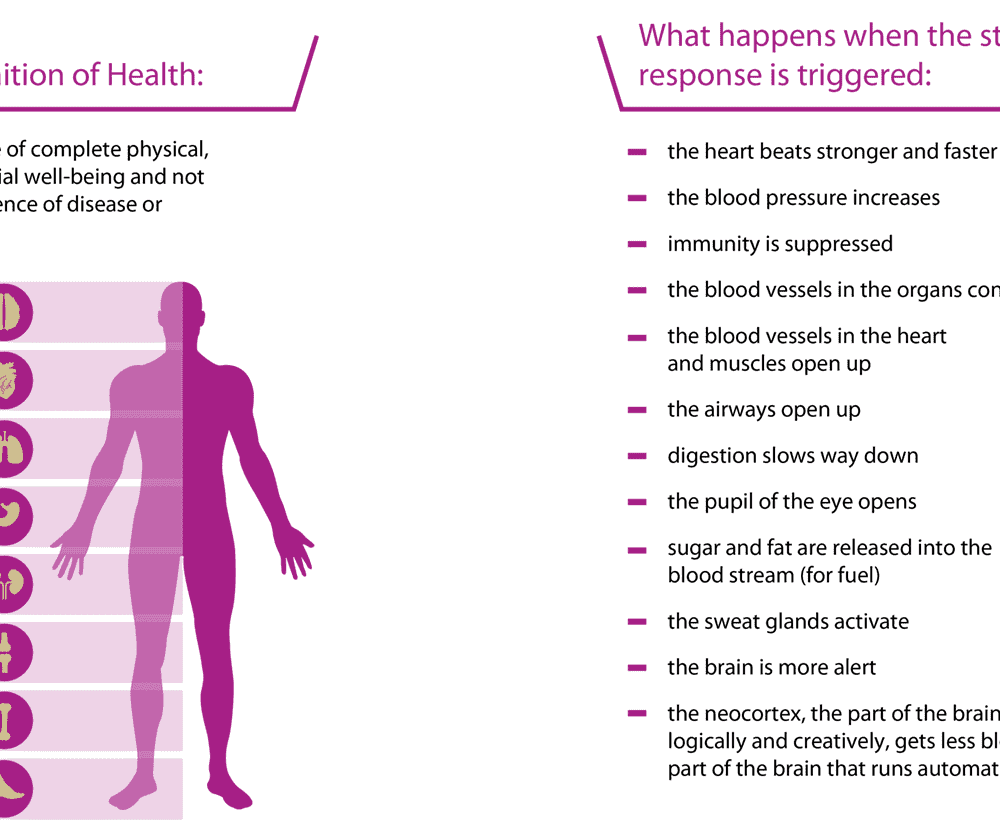Stress: The Adrenal Glands
By chiropractor Dr. Annika Jende
Normally when we talk about glands, people think of the kind of glands that swell up in your neck when you have a cold, or the ones that get taken out when there is cancer surgery. Those are lymphatic glands, and have (almost) nothing to do with the stress glands. There are many different kind of glands in the body, and what makes them glands is that they secrete something that affects something else.
The technical term for the stress glands is the adrenal glands (aka “adrenals”), and if you are familiar with the term “I am running on adrenaline” you know where the term comes from: Adrenaline is the hormone secreted by the adrenal glands. (In America they call it epinephrine, because someone was using the term adrenaline commercially. It just doesn’t have the same ring to it, does it?).
The adrenal glands are two small glands that sit on top of the kidneys (ad= next to; renal = kidney). What makes the adrenal glands special (according to AJ) is that the inside of them, the medulla, is actually nervous system tissue that has changed to become a hormone-secreting tissue rather than a bundle of nerve cells that stimulate a specific end organ. (This is why sometimes when we want to support the adrenal glands we end up giving something you’d normally think of as something to support the brain). In effect what that means is that you have that quick, sort-term action of the sympathetic nervous system reinforced by the longer-lasting action of the hormone adrenaline.
Stress: What happens?
There is a “one size fits all” response that the body has to any kind of stressful situation (whether perceived or real). The interesting and at times (for some people, a lot of the time) unhelpful thing is that the body reacts in the same way, whether you are in a life-threatening situation or “only” in a situation that you perceive to be threatening.
For example: the way your body feels after you have put your foot on the brake to avoid an accident is not all that different to how your body feels when you’re about to go and have a job interview, or do a presentation (assuming those situations make you nervous). Once upon a time, being expelled from your community would mean almost certain death, which is why for humans disapproval by important others can be deeply stressful. In those situations, however, the fact that the brain shuts down the logical, thinking part in favour of the fast, subconscious part can be very counterproductive. But I am getting ahead of myself. Hold that space.
So what happens when we are in a threatening situation?
Recall that it’s also called the fight-or-flight response. So the body is getting ready for fast, short-term, physical action. So when the sympathetic nervous system and the adrenal glands fire, this is what happens:
- the heart beats stronger and faster
- your blood pressure increases
- the blood vessels in the organs constrict
- the blood vessels in the heart and muscles open up
- the airways open up
- digestion slows way down
- the pupil of the eye opens
- sugar and fat are released into the blood stream (for fuel)
- the sweat glands activate
- the brain is more alert
- the neocortex, the part of the brain that thinks logically and creatively, gets less blood than the part of the brain that runs automatically. (In a situation like the accident mentioned above, this is a good thing, because you will have braked before you consciously realize that there has been a threat. But when you are in the middle of an argument, the old recommendation of taking a deep breath and counting to 10 is actually really valuable, because you buy yourself time to think, rather than just to react.)
I am sure you can all recall a situation where your body was reacting in this way. Personally, I remember many an exam when my body was doing just that!
To be continued….
Check out these articles on whether stress can be good for you
https://spectrumchiropractic.com.au/what-is-stress/
https://spectrumchiropractic.com.au/is-there-such-a-thing-as-not-enough-stress/
Check out this article on stress management
https://spectrumchiropractic.com.au/stress-management/
Image by Dr. Annika Jende

